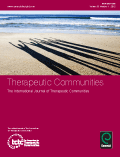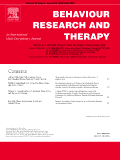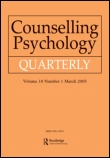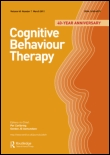
Therapeutic Communities
Scope & Guideline
Elevating discourse in therapeutic community practices.
Introduction
Aims and Scopes
- Community Dynamics and Therapeutic Relationships:
Focusing on how interpersonal relationships and group dynamics within therapeutic communities influence treatment outcomes, this area explores the essential factors that contribute to effective therapy. - Transdisciplinary Approaches:
The journal promotes research that bridges various disciplines, such as psychology, sociology, and medicine, to enhance therapeutic practices, demonstrating the interconnectedness of different fields in understanding community-based interventions. - Cultural and Contextual Adaptation:
Research examining how therapeutic community models can be adapted to different cultural and social contexts, highlighting the importance of local practices in enhancing rehabilitation efforts. - Evaluation of Therapeutic Models:
A focus on assessing the effectiveness of different therapeutic community models through qualitative and quantitative methodologies, ensuring evidence-based practices are at the forefront of therapeutic community research. - Innovative Interventions and Practices:
The journal encourages the exploration of new therapeutic interventions and practices within communities, examining their impact on various populations, including those with substance use disorders and mental health challenges.
Trending and Emerging
- Impact of COVID-19 on Therapeutic Practices:
There is a significant increase in research examining how the COVID-19 pandemic has affected therapeutic communities, showcasing the need for adaptation and resilience in treatment settings. - Qualitative Research Approaches:
A growing emphasis on qualitative methodologies to understand the intricate dynamics of therapeutic communities is emerging, allowing for deeper insights into personal experiences and community interactions. - Focus on Specific Populations:
Emerging interest in therapeutic communities tailored for specific populations, such as women in custody and individuals with personality disorders, reflects a more nuanced understanding of diverse treatment needs. - Integration of Psychometric Assessments:
The incorporation of psychometric evaluations to measure the effectiveness of therapeutic interventions is gaining traction, emphasizing the importance of data-driven approaches in community settings. - Transcultural and Global Perspectives:
Research exploring the transcultural transferability of therapeutic community models is on the rise, highlighting the importance of understanding how these models can be adapted across different cultural contexts.
Declining or Waning
- Traditional Therapeutic Community Models:
There is a noticeable decrease in publications focusing solely on traditional therapeutic community models, as researchers are increasingly exploring innovative and transdisciplinary approaches. - Generalized Substance Abuse Treatment:
Research that broadly addresses substance abuse treatment without specific contextual considerations is becoming less prominent, with a shift towards more tailored, context-specific studies. - Longitudinal Studies:
The frequency of longitudinal studies assessing long-term outcomes in therapeutic communities has declined, likely due to a growing emphasis on immediate impacts and qualitative insights. - Focus on Adult Populations:
Research centered on adult populations is waning, as there is a growing interest in exploring therapeutic communities for diverse groups, including adolescents and women in custody.
Similar Journals

BEHAVIOUR RESEARCH AND THERAPY
Illuminating Paths to Mental Wellness through Research.Behaviour Research and Therapy, published by Pergamon-Elsevier Science Ltd, stands as a pivotal journal in the realm of clinical, developmental, and cognitive psychology. With a distinguished history dating back to 1963, this esteemed journal has continuously provided a vital platform for groundbreaking research focused on understanding and treating psychological disorders. It holds an impressive impact factor and is categorized in the Q1 quartile across multiple domains including Clinical Psychology, Developmental and Educational Psychology, Experimental and Cognitive Psychology, and Psychiatry and Mental Health. With its Scopus ranking placing it in the top percentiles of its field, Behaviour Research and Therapy serves as an essential resource for researchers, professionals, and students seeking to remain at the forefront of psychological science. While it operates under a traditional subscription model rather than an open access framework, its contributions are invaluable for advancing our understanding of behavior and therapeutic interventions.

Counselling Psychology Quarterly
Navigating the Complexities of Human BehaviorCounselling Psychology Quarterly, published by Routledge Journals, Taylor & Francis Ltd, is a prestigious journal situated at the forefront of mental health research and practice. With a focus on Applied Psychology, Clinical Psychology, and Psychiatry and Mental Health, this journal serves as a vital resource for researchers, professionals, and students keen on exploring the intricacies of therapeutic practices and psychological support systems. The journal boasts an impressive rank in the Scopus database, being positioned 54th in Clinical Psychology and 143rd in Psychiatry and Mental Health, reflecting its significance in the wider academic community. Operating since 1988, the journal continues to publish high-quality, peer-reviewed articles that contribute to the evolving discourse in counseling methods and innovations. While it does not currently offer open access, readers can access its wealth of knowledge through institutional subscriptions. With its commitment to advancing understanding and practice in the field, Counselling Psychology Quarterly stands as an essential publication for those dedicated to the study and practice of psychology.

PSYCHOLOGICAL MEDICINE
Elevating the discourse in psychological medicine.PSYCHOLOGICAL MEDICINE is a leading journal in the field of psychiatry and psychology, published by Cambridge University Press. With its ISSN 0033-2917 and E-ISSN 1469-8978, this journal has firmly established itself as a premier platform for cutting-edge research since its inception in 1970. It consistently ranks in the top quartile for both Applied Psychology and Psychiatry and Mental Health, reflecting its exceptional impact in the field, with a 2023 Scopus ranking of #36 out of 567 in Psychiatry and Mental Health, and #21 out of 249 in Applied Psychology. The journal aims to publish comprehensive studies that explore the interplay between psychological phenomena and medical health, contributing vital insights that advance both theoretical understanding and clinical practice. Although it is not an Open Access journal, PSYCHOLOGICAL MEDICINE remains a vital resource for researchers, professionals, and students committed to the scientific investigation of mental health issues.

COGNITIVE BEHAVIOUR THERAPY
Unveiling the Power of Cognitive-Behavioral TechniquesCOGNITIVE BEHAVIOUR THERAPY is a leading peer-reviewed journal focused on the clinical applications and advancements in cognitive-behavioral therapy (CBT), published by Routledge Journals, Taylor & Francis Ltd. Since its inception in 2002, the journal has rapidly gained prominence in the field of clinical psychology, currently holding a distinguished Q1 ranking in this category for 2023, as well as an impressive Scopus rank of #18 out of 311 journals, positioning it in the 94th percentile. This publication serves as a vital resource for researchers, professionals, and students alike, fostering rigorous scholarly discussions on innovative approaches, efficacy studies, and theoretical frameworks in CBT. The journal, accessible in both print and electronic formats (ISSN 1650-6073 and E-ISSN 1651-2316), aims to disseminate groundbreaking research that enhances the understanding and practice of cognitive-behavioral interventions, thereby contributing significantly to mental health care worldwide. Centered in Sweden, it reflects a commitment to academic excellence and global outreach in the psychosocial domain.

Journal of Behavioral and Cognitive Therapy
Transforming therapy with evidence-based practices.Journal of Behavioral and Cognitive Therapy, published by ELSEVIER, is an esteemed academic journal dedicated to advancing the fields of clinical psychology, neuropsychology, and psychiatry through rigorous research and innovative practices. With an ISSN of 2589-9791 and Q2 rankings in both Clinical Psychology and Neuropsychology as of 2023, it demonstrates a strong commitment to fostering high-quality, impactful scholarship. Holding a Scopus Rank of 129 among 311 in Clinical Psychology, this journal serves as a significant platform for researchers and practitioners to disseminate their findings and engage in vital discussions surrounding behavioral and cognitive therapies. The journal's scope encompasses an array of topics pertinent to mental health, providing valuable insights that empower professionals and students alike. Although not Open Access, articles published within this journal have the potential to reach a diverse audience across the globe, enhancing collaboration and knowledge exchange in the critical arena of mental health. Located in France, the Journal of Behavioral and Cognitive Therapy continues to contribute to the global discourse on evidence-based practices and therapeutic innovations.

AMERICAN JOURNAL OF DANCE THERAPY
Bridging Art and Mental HealthAMERICAN JOURNAL OF DANCE THERAPY, published by KLUWER ACADEMIC-HUMAN SCIENCES PRESS, stands as a pivotal platform in the field of dance therapy, bridging the gap between creative arts and mental health disciplines. Since its inception in 1977, this journal has fostered a deeper understanding of the therapeutic benefits of dance, showcasing empirical research, case studies, and innovative practices that promote emotional and psychological well-being. As of 2023, it holds a Q4 category in Psychiatry and Mental Health, with a Scopus rank of #417 out of 567 journals in this area, reflecting its unique contributions amidst a competitive landscape. With an emphasis on accessibility for professionals and researchers, the journal serves as an essential resource for those devoted to the advancement of dance therapy, offering insights and findings that can influence both clinical practice and academic inquiry. Join a growing community of scholars and practitioners dedicated to exploring the transformative power of movement in healing and therapeutic settings.

ARCHIVES OF PSYCHIATRIC NURSING
Shaping the future of psychiatric nursing research.Archives of Psychiatric Nursing, a prestigious journal published by W.B. Saunders Co. - Elsevier Inc., serves as a vital resource in the field of Psychiatry and Mental Health. With an ISSN of 0883-9417 and E-ISSN 1532-8228, this peer-reviewed publication has been contributing to the academic discourse since its inception in 1987 and is set to continue until 2024. Ranked in the Q2 category for Psychiatry and Mental Health in 2023 and holding a significant position as rank 14 out of 45 in the Nursing - Psychiatric Mental Health category, it positions itself within the 70th percentile, showcasing its influence and importance in the domain. Though not an open-access journal, it provides a range of access options for readers seeking advanced research and insights. As a dynamic platform, the journal is dedicated to expanding knowledge and promoting best practices among psychiatric nursing professionals, researchers, and students, making it an essential tool for those engaged in mental health care and research.

Occupational Therapy in Mental Health
Fostering Dialogue for Better Therapeutic PracticesOccupational Therapy in Mental Health, published by Routledge Journals, Taylor & Francis Ltd, is a pivotal resource for professionals and researchers in the fields of mental health, occupational therapy, and applied psychology. With a rich publication history dating back to 1980 and continuing to the present, the journal offers a platform for innovative research and discussions that bridge occupational therapy practices with mental health outcomes. Although currently categorized in the fourth quartile across various disciplines, it fosters a growing discourse within the community, aiming to elevate therapeutic practices and understanding of mental health interventions. The journal is committed to sharing empirical studies, literature reviews, and case studies that inform and enhance clinical practice, making it an essential read for practitioners, educators, and students alike. The journal welcomes submissions that explore the intersection of occupational therapy and mental health, contributing to the dialogue on improving patient care and outcomes in diverse settings.

JOURNAL OF CONTEMPORARY PSYCHOTHERAPY
Pioneering Approaches to Modern Mental Health CareJournal of Contemporary Psychotherapy is a prestigious academic journal dedicated to exploring the evolving practices and theories in the field of psychotherapy. Published by Springer International Publishing AG, the journal has been a vital resource since its inception in 1968, showcasing works that bridge the gap between clinical psychology and psychiatry. With an impressive impact factor reflected in its Q2 ranking in both Clinical Psychology and Psychiatry and Mental Health, the journal caters to a diverse audience of researchers, practitioners, and students keen on advancing their understanding of contemporary therapeutic approaches. Though it operates under a traditional subscription model, the journal is committed to disseminating high-quality research that contributes to the ongoing dialogue in mental health treatment and practice. By focusing on innovative methods and empirical studies, Journal of Contemporary Psychotherapy plays a crucial role in shaping future directions in psychotherapy and mental health care.

JOURNAL OF PSYCHOTHERAPY INTEGRATION
Pioneering Integrative Approaches in Mental HealthJOURNAL OF PSYCHOTHERAPY INTEGRATION, an esteemed publication of the Educational Publishing Foundation—American Psychological Association, serves as a vital resource for researchers and practitioners in the fields of clinical psychology and psychiatry. With an ISSN of 1053-0479 and an E-ISSN of 1573-3696, this journal has become a cornerstone in advancing knowledge on the integration of psychotherapeutic techniques, offering insights into the evolving practices from 1996 to 2024. The journal holds a respectable status in academic circles, categorized in the Q2 quartile for both Clinical Psychology and Psychiatry and Mental Health, and achieving impressive Scopus rankings that position it within the top percentiles of its fields. Despite the absence of Open Access, readers can benefit from its comprehensive articles that blend theoretical frameworks with empirical research, aimed at enhancing therapeutic outcomes. As an important forum for scholarly dialogue, the JOURNAL OF PSYCHOTHERAPY INTEGRATION underscores the significance of integrative approaches in mental health treatment, making it an essential read for professionals, researchers, and students committed to the advancement of psychotherapy practices.